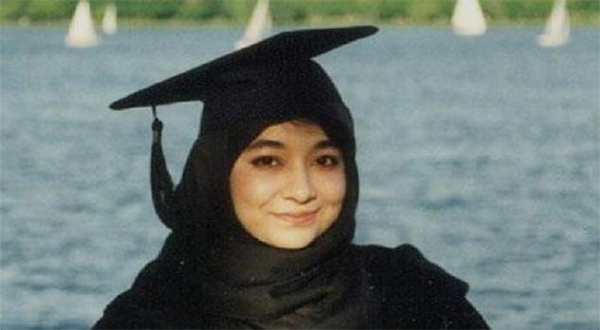For years, we—American Muslims, human rights advocates, and people of conscience—have fought tirelessly for the release of Dr. Aafia Siddiqui.
We have appealed to the U.S. government through every possible channel. We have submitted petitions, gathered a historic number of signatures for clemency, and engaged in direct dialogue with officials at the highest levels.
We have stood outside the gates of FMC Carswell, the prison where she is held in Texas, raising our voices in protest, hoping that maybe this time, our calls for justice would be answered.
But each time, we have walked away with nothing.
Each time, we have returned to our homes knowing that Dr. Aafia is still locked in a cell, still suffering, still waiting for justice that never comes. I have personally tried to offer chaplaincy to her—to provide her with the spiritual care that she, as a Muslim, has been denied for over 20 years. But even that was rejected. It is a painful irony that in a country that speaks of religious freedom, a chaplain is blocked from offering prayer and comfort to a woman who has been broken by years of torture and isolation.
But more than my pain, more than the heartbreak of American Muslims who have fought for her release, is the devastation of her family. Dr. Fowzia Siddiqui, her sister, has embodied the very definition of perseverance. She has come to the United States several times, traveling across continents in the desperate hope of freeing her sister, fighting bureaucracy and diplomatic indifference at every step. Yet she has regularly been met with silence, rejection, and the cruel reality that Aafia—once a brilliant scientist with a world of potential ahead of her—becomes more unrecognizable with each passing year due to the torture she has endured.
Still, Dr. Fowzia has never wavered. She has knocked on every door, held every press conference, and pleaded with every leader who would listen.
Her unwavering commitment is a testament to the love of a sister who refuses to let Aafia be forgotten. She has done more for Pakistan’s daughter than Pakistan itself has.
And she is not alone in this struggle. For years, activists like the elder Mauri Saalakhan and the young lawyer Maria Kari have worked relentlessly to keep Aafia’s name alive when so many would rather move on. Now, Clive Stafford Smith, who has been advocating for her for the past two years, has joined this battle. His legal expertise, moral clarity, and unshakable commitment to human rights have breathed new life into the campaign for Aafia’s release. He has seen firsthand the injustice of her imprisonment, and has uncovered crucial facts that confirm her innocence. His leadership in advocating for a prisoner exchange has provided a clear, practical
path to Aafia’s freedom.
But even with all of this effort—by Dr. Fowzia, by Clive Stafford Smith, by thousands of activists across the world—Pakistan remains missing from this fight.
Pakistan—the country Aafia belongs to, the country that should have been fighting for her with every diplomatic tool available this entire time—can no longer sit on the sidelines. We can yell in front of the cage, but it is you who has a unique set of keys.
The American Muslim community has done what it can within the U.S. political system. But we cannot do what only you can.
Joe Biden denied our clemency request, and Donald Trump is now in office. With that comes a new reality that presents us with a President who is known to be a shrewd dealmaker. He has a record of engaging in prisoner exchanges. Not out of mercy or morality, but because he sees deals, not people. This may be the only way to bring Aafia home—through a transaction, not an appeal to justice.
If a nation like Afghanistan or Iran, despite being longtime U.S. adversaries, can negotiate prisoner swaps, why can’t Pakistan? More than that—if foreign nations that Aafia has never even set foot in are willing to accept her, what excuse does Pakistan have to abandon her?
Aafia Siddiqui’s case is more than a legal battle. It is a test of Pakistan’s sovereignty, dignity, and commitment to its people. The world sees how nations fight for their citizens. The U.S.
brings home its prisoners. Yet Pakistan, time and again, has failed the most basic test of national honor.
Aafia Siddiqui was disappeared from Pakistan, sold off to the highest bidder, and then convicted in an American court through a process riddled with inconsistencies and outright fabrications.
Pakistan’s leaders—across multiple administrations—have treated her as a diplomatic inconvenience rather than a citizen worth fighting for.
Former US Attorney General Ramsey Clark has described the case of Dr. Aafia Siddiqui as “the worst case of individual injustice” he had ever seen. And after everything she has
endured—kidnapping, imprisonment, torture—Aafia has been described as “the most wronged woman on the planet.”
If even those outside of Pakistan can see the gravity of this injustice, why is her own nation so indifferent?
I have spoken to the heads of two nations both willing to grant Aafia a Visa and place to live should she be released. But even they are shocked by the indifference of Pakistan to its own
citizens. Why would Aafia find more acceptance from two nations she has never even been to than her own place of birth?
To Prime Minister Shehbaz Sharif, to the leadership of Pakistan’s security establishment, to every official who has the power to act—history will remember your choices.
Dr. Aafia Siddiqui is your citizen. She is your responsibility. She should be home. She is the daughter of Pakistan, not America. Whatever is left of her after all these years of torture and abandonment, let her live the rest of her life with whoever remains from her family.
This nightmare can end. You just have to do your part. We will continue to do ours.





